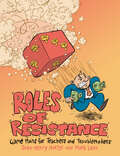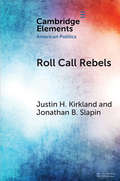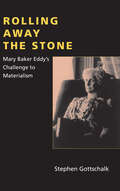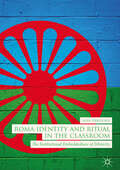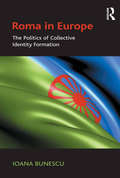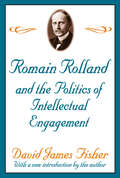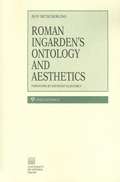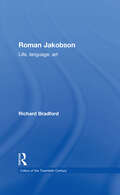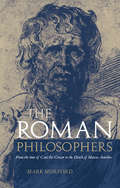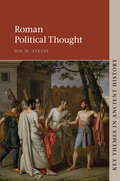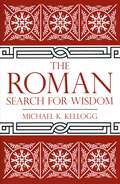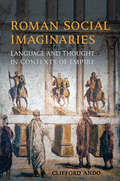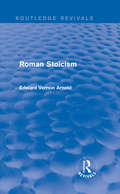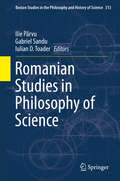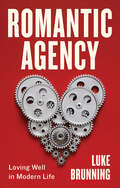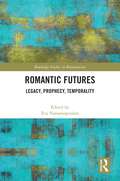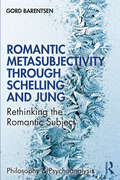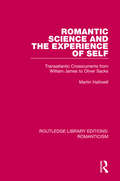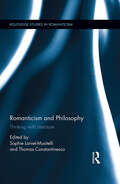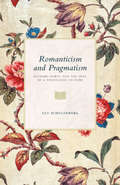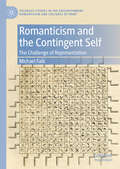- Table View
- List View
Roles of Resistance: Game Plans for Teachers and Troublemakers
by Mark Leier John-Henry HarterWelcome to class. Today, we’ll be learning how to become (effective) troublemakers. In this classroom, no one gets in trouble for defying authority. Designed for educators and facilitators from the union hall to the lecture hall, Roles of Resistance outlines revolutionary lesson plans on how to fight the power with people power. The thirteen lesson plans in this book created by John-Henry Harter and Mark Leier can be used independently or combined to create a semester-long course. Sections include units on teaching political economy, labour history, and social activism based on democratic, experiential teaching, including role-plays, simulations, and games. The tried and tested classroom activities in this teacher’s guide—successfully applied in high schools, universities, and union classrooms—are bound to create a vibrant learning experience, enriching debates, and providing the main tool we need to change the world: collective action.
Roles, Rights, and Responsibilities in UK Education
by Hilary McqueenTop scholars systematically explore roles, rights, and responsibilities of major participants in UK education: the government, the educators, the learners, and the parents. They investigate the inequalities produced by their current arrangement and look into how changing these arrangements might lead to different outcomes for all involved.
Roll Call Rebels: Strategic Dissent in the United States and United Kingdom (Elements in American Politics)
by Jonathan B. Slapin Justin H. KirklandScholars of legislative politics often note the many differences between the British House of Commons and the United States House of Representatives. These include differences in party strength, members' partisan loyalty on votes, and general institutional structure. Because of these differences, scholars have rarely compared these chambers directly. This Element aims to do precisely that. The authors point out the many similar motivations of members in both chambers, and leverage these similar motivations to theorize that member ideology, as well as how party agenda interact to produce party disloyalty. Using data on legislative voting following changes in agenda control, the authors demonstrate that ideological extremists in both the US and UK use party disloyalty to connect with ideologically extreme constituents. The similarities in patterns across these chambers suggest that legislative scholars have much to gain by considering the commonalities across American and British politics, and in general, by thinking more frequently about US legislative politics in a comparative context.
Rolling Away the Stone: Mary Baker Eddy's Challenge to Materialism
by Stephen Gottschalk“Gottschalk distinguishes himself by placing Christian Science in the larger context of American religion . . . sheds new light on Eddy’s life and work.” —Publishers WeeklyThis richly detailed study highlights the last two decades of the life of Mary Baker Eddy, a prominent religious thinker whose character and achievement are just beginning to be understood. It is the first book-length discussion of Eddy to make full use of the resources of the Mary Baker Eddy Collection in Boston. Rolling Away the Stone focuses on her long-reaching legacy as a Christian thinker, specifically her challenge to the materialism that threatens religious belief and practice.“Gottschalk has provided readers with a masterful account of Christian Science in its heyday. This book is a first-rate read for students of American religion and provides a look into how one of the country’s more complex religious figures dealt with materialism in the late-nineteenth-century America.” —Religious Studies Review“Gottschalk does a superb job of providing historical context for the chaotic events of Eddy’s final decades.” —Choice“Gottschalk’s account is well told and enriched by fresh material now available from the Mary Baker Eddy Library for the Betterment of Humanity.” —Christian Science Monitor“The book includes a great deal of fresh research and honest scholarship . . . for the individual wanting to sink his or her teeth into a serious study of Eddy . . . you have a lot to look forward to in reading this book.” —The Christian Science Journal
Roma Identity and Ritual in the Classroom: The Institutional Embeddedness of Ethnicity
by Jana ObrovskáThis book addresses the dynamics of interethnic relationships in ethnically mixed classrooms in the Czech Republic. The classroom is a space in which the boundaries and meanings of facets of identity such as ethnicity, class and gender are negotiated on a daily basis: using rich ethnographic data, the author grounds the analysis in a novel theoretical framework which uses the traditional concept of ritual to examine peer cultures. Highlighting the perspectives of the students themselves, their own peer cultures and the agency of the minority youth present in the classroom, the book reinforces the idea that the dynamics of peer culture can be the scene for successful peer inclusion strategies as well as a stage for the reproduction of inequalities. The author offers a rich array of data from post-socialist classrooms, which are almost invisible in the dominant debates surrounding ethnicity. This revelatory book will be of interest and value to students and scholars of social anthropology, the sociology of education and race and ethnicity in education, as well as practitioners working with minority youth.
Roma in Europe: The Politics of Collective Identity Formation
by Ioana BunescuThis path-breaking book explains the processes through which the heterogeneous population of Roma in Europe constitutes itself into a transnational collective identity through the practices and discourses of everyday life, as well as through those of identity politics. It illustrates how the collective identity formation of the Roma in Europe is constituted simultaneously in the local, national, and European contexts, drawing attention to the mismatches and gaps between these levels, as well as the creative opportunities for achieving this political aim. Bunescu demonstrates that the differences and stereotypes between the Roma and the non-Roma, as well as those among different groups of Roma, fulfil a politically creative function for the constitution of a unified transnational collective identity for the Roma in Europe. The book is unique - comprising chapters ranging from local ethnographic accounts of inter-ethnic relations of rural Roma in a Transylvanian village, to interviews with international Roma political activists, controversial Roma kings, and an extensive chapter on their role of bridging the local and the higher levels of identity politics, visual depictions of a diversity of Roma living spaces and interpretations of the politics of space in private dwellings, as well as in public venues, such as at Roma international festivals.
Romain Rolland and the Politics of the Intellectual Engagement
by David FisherThis intellectual portrait of Romain Rolland (1866-1944)--French novelist, musicologist, dramatist, and Nobel prizewinner in 1915--focuses on his experiments with political commitment against the backdrop of European history between the two world wars. Best known as a biographer of Beethoven and for his novel, Jean-Christophe, Rolland was one of those nonconforming writers who perceived a crisis of bourgeois society in Europe before the Great War, and who consciously worked to discredit and reshape that society in the interwar period. Analyzing Rolland's itinerary of engaged stands, David James Fisher clarifies aspects of European cultural history and helps decipher the ambiguities at the heart of all forms of intellectual engagement.Moving from text to context, Fisher organizes the book around a series of debates--Rolland's public and private collisions over specific committed stands--introducing the reader to the polemical style of French intellectual discourse and offering insight into what it means to be a responsible intellectual. Fisher presents Rolland's private ruminations, extensive research, and reexamination of the function and style of the French man of letters. He observes that Rolland experimented with five styles of commitment: oceanic mysticism linked to progressive, democratic politics; free thinking linked to antiwar dissent; pacifism and, ultimately, Gandhism; antifacism linked to anti-imperialism, antiracism, and all-out political resistance to fascism; and, most controversially, fellow traveling as a form of socialist humanism and the positive side of antifascism. Fisher views Rolland's engagement historically and critically, showing that engaged intellectuals of that time were neither naive propagandists nor dupes of political parties.David James Fisher makes a case for the committed writer and hopes to re-ignite the debate about commitment. For him, Romain Rolland sums up engagement in a striking, dialectical formula:
Roman Girlhood and the Fashioning of Femininity
by Lauren CaldwellElite women in the Roman world were often educated, socially prominent, and even relatively independent. Yet the social regime that ushered these same women into marriage and childbearing at an early age was remarkably restrictive. In the first book-length study of girlhood in the early Roman Empire, Lauren Caldwell investigates the reasons for this paradox. Through an examination of literary, legal, medical, and epigraphic sources, she identifies the social pressures that tended to overwhelm concerns about girls' individual health and well-being. In demonstrating how early marriage was driven by a variety of concerns, including the value placed on premarital virginity and paternal authority, this book enhances an understanding of the position of girls as they made the transition from childhood to womanhood.
Roman Ingarden's Ontology and Aesthetics
by Jeff MitscherlingA leading Polish philosopher of the 20th century, Roman Ingarden is principally renowned in Western culture for his work in aesthetics and the theory of literature. Jeff Mitscherling demonstrates, in this extensive work, how Ingarden's thought constitutes a major contribution to the more fundamental fields of ontology and metaphysics. Unparalleled in existing literature, Mitscherling's comprehensive survey of Ingarden's philosophy will give the reader an informed introduction to this major work of phenomenological analysis.
Roman Jakobson: Life, Language and Art (Critics of the Twentieth Century)
by Richard BradfordIn Roman Jakobson Richard Bradford reasserts the value of Jakobson's work, arguing that he has a great deal to offer contemporary critical theory and providing a critical appraisal the sweep of Jakobson's career. Bradford re-establishes Jakobson's work as vital to our understanding of the relationship between language and poetry. By exploring Jakobson's thesis that poetry is the primary object language, Roman Jakobson: Life, Language, Art offers a new reading of his work which includes the most radical elements of modernism. This book will be invaluable to students of Jakobson and to anyone interested in the development of critical theory, linguistics and stylistics.
Roman Law in the State of Nature
by Benjamin Straumann Belinda CooperRoman Law in the State of Nature offers a new interpretation of the foundations of Hugo Grotius' natural law theory. Surveying the significance of texts from classical antiquity, Benjamin Straumann argues that certain classical texts, namely Roman law and a specifically Ciceronian brand of Stoicism, were particularly influential for Grotius in the construction of his theory of natural law. The book asserts that Grotius, a humanist steeped in Roman law, had many reasons to employ Roman tradition and explains how Cicero's ethics and Roman law – secular and offering a doctrine of the freedom of the high seas – were ideally suited to provide the rules for Grotius' state of nature. This fascinating new study offers historians, classicists and political theorists a fresh account of the historical background of the development of natural rights, natural law and of international legal norms as they emerged in seventeenth-century early modern Europe.
Roman Philosophers: From The Time Of Cato The Censor To The Death Of Marcus Aurelius
by Mark MorfordThe philosophers of the Roman world were asking questions whose answers had practical effects on people's lives in antiquity, and which still influence our thinking to this day. In spite of being neglected in the modern era, this important age of philosophical thought is now undergoing a revival of interest.Mark Morford's lively survey makes these recent scholarly developments accessible to a wide audience, examining the writings and ideas of both famous and lesser known figures - from Cato the Censor in 155 BCE to Marcus Aurelius in 180 CE. Based around extensive and fully translated quotations from the philosophical texts of the era, full consideration is given throughout to historical, political and cultural context.
Roman Political Thought
by Dean HammerRoman Political Thought is the first comprehensive treatment of the political thought of the Romans. Dean Hammer argues that the Romans were engaged in a wide-ranging and penetrating reflection on politics. The Romans did not create utopias. Instead, their thinking was relentlessly shaped by their own experiences of violence, the enormity and frailty of power, and an overwhelming sense of loss of the traditions that oriented them to their responsibilities as social, political, and moral beings. However much the Romans are known for their often complex legal and institutional arrangements, the power of their political thought lies in their exploration of the extra-institutional, affective foundations of political life. The book includes chapters on Cicero, Lucretius, Sallust, Virgil, Livy, Seneca, Tacitus, Marcus Aurelius, and Augustine and discussions of Polybius, the Stoics, Epicurus, and Epictetus.
Roman Political Thought (Key Themes In Ancient History)
by Jed W. AtkinsWhat can the Romans teach us about politics? <P><P>This thematic introduction to Roman political thought shows how the Roman world developed political ideas of lasting significance, from the consequential constitutional notions of the separation of powers, political legitimacy, and individual rights to key concepts in international relations, such as imperialism, just war theory, and cosmopolitanism. Jed W. Atkins relates these and many other important ideas to Roman republicanism, traces their evolution across all major periods of Roman history, and describes Christianity's important contributions to their development. Using the politics and political thought of the United States as a case study, he argues that the relevance of Roman political thought for modern liberal democracies lies in the profound mixture of ideas both familiar and foreign to us that shape and enliven Roman republicanism. Accessible to students and non-specialists, this book provides an invaluable guide to Roman political thought and its enduring legacies.<P> Shows how the Romans contributed to key political ideas of lasting importance and provides a comprehensive account of Roman 'republicanism'.<P> Includes introductions to all periods of Roman history, key Roman authors, and relevant scholarship in the fields of political theory, Roman history, ancient philosophy, Latin literature, and early Christian studies.<P> Suggests how Roman political thought is applicable to modern liberal democracies, focusing on the United States as a case-study.
Roman Search for Wisdom
by Michael K. KelloggThe Roman "philosophy of life" as mirrored in the literature of ten outstanding representative authors Though Rome conquered much of the world and established an empire that lasted more than a millennium, its citizens sometimes expressed a sense of inferiority to the intellectual accomplishments of ancient Greece. The notion that Roman philosophers, thinkers, and writers were just pale imitations of Greek originals has persisted to this day. Even the great Roman poet Horace wrote, "Captive Greece took its Roman captor captive,/ Invading uncouth Latium with its arts." Michael K. Kellogg puts this notion to rest in this lively, very readable overview of Roman literature. The author uncovers many examples of Roman wisdom, showing that the Roman contribution to intellectual history is considerable and need not take second place to ancient Greek literature. Kellogg offers fresh and engaging portraits of poets (Lucretius, Virgil, Horace, Ovid); dramatists (Plautus, Terence, Seneca); biographers (Plutarch, Suetonius); historians (Livy, Tacitus); and philosophers (Cicero, Marcus Aurelius), against the background of Roman history. The contemporary reader will come away from this excellent survey with the realization that even today our culture still bears the lasting imprint of ancient Rome.
Roman Social Imaginaries
by Clifford AndoIn an expansion of his 2012 Robson Classical Lectures, Clifford Ando examines the connection between the nature of the Latin language and Roman thinking about law, society, and empire. Drawing on innovative work in cognitive linguistics and anthropology, Roman Social Imaginaries considers how metaphor, metonymy, analogy, and ideation helped create the structures of thought that shaped the Roman Empire as a political construct.Beginning in early Roman history, Ando shows how the expansion of the empire into new territories led the Romans to develop and exploit Latin's extraordinary capacity for abstraction. In this way, laws and institutions invented for use in a single Mediterranean city-state could be deployed across a remarkably heterogeneous empire.Lucid, insightful, and innovative, the essays in Roman Social Imaginaries constitute some of today's most original thinking about the power of language in the ancient world.
Roman Stoicism: Being Lectures On The History Of The Stoic Philosophy With Special Reference To Its Development Within The Roman Empire (Routledge Revivals)
by Edward Vernon ArnoldRoman Stoicism, first published in 1911, offers an authoritative introduction to this fascinating chapter in the history of Western philosophy, which throughout the 20th century has been rediscovered and rehabilitated among philosophers, theologians and intellectual historians. Stoicism played a significant part in Roman history via the public figures who were its adherents (Seneca is perhaps the most famous); and, as it became more widely accepted, it assumed the features of a religion. The Stoic approach to physics, the universe, divine providence, ethics, law and humanity are all investigated, as is its diffuse impact upon literature. The origins of Christianity are also examined. Arnold offers a sympathetic reading of St. Paul in light of Stoicism, and regards the latter as the crucial bridge between Antiquity and Christendom: it allowed a swathe of Pagan intellectuals to join the Church and influenced the development of Christian doctrine, thus making an immense contribution to the bedrock of modern European civilisation.
Romanian Studies in Philosophy of Science
by Gabriel Sandu Ilie Pȃrvu Iulian D. ToaderThis book presents a collection of studies by Romanian philosophers, addressing foundational issues currently debated in contemporary philosophy of science. It offers a historical survey of the tradition of scientific philosophy in Romania. It examines some problems in the foundations of logic, mathematics, linguistics, the natural and social sciences. Among the more specific topics, it discusses scientific explanation, models, and mechanisms, as well as memory, artifacts, and rules of research. The book is useful to those interested in the philosophy of real science, but also to those interested in Romanian philosophy.
Romantic Agency: Loving Well in Modern Life
by Luke BrunningThis is a book for people energized by the possibilities of modern intimacy, but who feel unsure about their own romantic lives. Alternative lifestyles such as nonmonogamy, while liberating in theory, can feel remote in practice, as we are fixed in place by insecurities and social pressures. In Romantic Agency, philosopher Luke Brunning encourages readers to think more deeply about what it means for relationships to not only work, but flourish. Guided by the thought that our abilities to be intimate cannot be taken for granted, he argues that our romantic agency is fragile and best cultivated alongside other people. Together we can become more realistic, balance playfulness with integrity, and value each other’s flourishing. Anyone can benefit from this exploration of intimate life, regardless of their relationship status or romantic ideals. Compelling and timely, Romantic Agency is a groundbreaking account of love and relationships.
Romantic Futures: Legacy, Prophecy, Temporality (Routledge Studies in Romanticism)
by Evy VarsamopoulouRomantic Futures is a collection which explores the significance of futurity in British Romanticism from a comparative perspective in three defining manifestations: the future as conscious legacy, by which is meant both influences or continuities and the (anticipations of) impact on the future; the future as revealed by prophecy, whether via religious figures or superstitions; and, a meditation on the temporality of the future, or the future as a concept. The book brings together a wide range of theoretical and disciplinary perspectives: from utopian studies, history, religion and cultural theory to future studies, neuroscience, video games and art history. Aiming to increase and diversify current critical engagement and highlight the contemporary relevance of the Romantics’ multivalent preoccupation with the future, this collection renews the dialogue between Romanticism and our critical relation to its contemporaneity, especially as it speaks to current understandings of the future in the sciences, arts and humanities.
Romantic Metasubjectivity Through Schelling and Jung: Rethinking the Romantic Subject (Philosophy and Psychoanalysis)
by Gord BarentsenRomantic Metasubjectivity Through Schelling and Jung: Rethinking the Romantic Subject explores the remarkable intellectual isomorphism between the philosophy of Friedrich Schelling and Carl Jung’s analytical psychology in order to offer a crucial and original corrective to the "reflection theory" of subjectivity. Arguing that the reflection theory of the subject does not do justice to the full compass of Romantic thinking about the human being, Romantic Metasubjectivity sees human identity as neither discursive aftereffect nor centred around a self-transparent "I" but rather as constellated around the centripetal force of what Novalis calls "The Self of one’s self." The author begins with a unique reading of Schelling’s early Naturphilosophie as primal site rather than Freudian scene, thinking this site through his Philosophical Inquiries Into the Nature of Human Freedom to The Ages of the World. Reading Jungian metapsychology and its core concepts as therapeutic amplifications of Schelling, the author articulates an intellectual counter-transference in which Schelling and Jung contemporise each other. The book then demonstrates how Romantic metasubjectivity operates in the libidinal matrix of Romantic poetry through readings of William Wordsworth’s The Prelude and Percy Shelley’s Prometheus Unbound. The book concludes with a discussion of the hit TV series Breaking Bad as a "case study" of the challenges Romantic metasubjectivity raises for fundamental ethical dilemmas which confront us in the twenty-first century. Romantic Metasubjectivity is a highly original work of scholarship and will appeal to students and scholars in German Idealism, Romanticism, philosophy, psychoanalysis, theory, Jung studies, and those with an interest in contemporary theories of the subject.
Romantic Science and the Experience of Self: Transatlantic Crosscurrents from William James to Oliver Sacks (Routledge Library Editions: Romanticism #Vol. 2)
by Martin HalliwellFirst published in 1999, this engaging interdisciplinary study of romantic science focuses on the work of five influential figures in twentieth-century transatlantic intellectual history. In this book, Martin Halliwell constructs an innovative tradition of romantic science by indicating points of theoretical and historical intersection in the thought of William James (American philosopher); Otto Rank (Austrian psychoanalyst); Ludwig Binswanger (Swiss psychiatrist); Erik Erikson (Danish/German psychologist); and Oliver Sacks (British neurologist). Beginning with the ferment of intellectual activity in late eighteenth-century German Romanticism, Halliwell argues that only with William James’ theory of pragmatism early in the twentieth century did romantic science become a viable counter-tradition to strictly empirical science. Stimulated by debates over rival models of consciousness and renewed interest in theories of the self, Halliwell reveals that in their challenge to Freud’s adoption of ideas from nineteenth-century natural science, these thinkers have enlarged the possibilities of romantic science for bridging the perceived gulf between the arts and sciences.
Romanticism and Philosophy: Thinking with Literature (Routledge Studies in Romanticism)
by Sophie Laniel-Musitelli Thomas ConstantinescoThis volume brings together a wide range of scholars to offer new perspectives on the relationship between Romanticism and philosophy. The entanglement of Romantic literature with philosophy is increasingly recognized, just as Romanticism is increasingly viewed as European and Transatlantic, yet few studies combine these coordinates and consider the philosophical significance of distinctly literary questions in British and American Romantic writings. The essays in this book are concerned with literary writing as a form of thinking, investigating the many ways in which Romantic literature across the Atlantic engages with European thought, from 18th- and 19th-century philosophy to contemporary theory. The contributors read Romantic texts both as critical responses to the major debates that have shaped the history of philosophy, and as thought experiments in their own right. This volume thus examines anew the poetic philosophy of Wordsworth, Coleridge, Blake, Shelley, and Clare, also extending beyond poetry to consider other literary genres as philosophically significant, such as Jane Austen’s novels, De Quincey’s autofiction, Edgar Allan Poe’s tales, or Emerson’s essays. Grounded in complementary theoretical backgrounds and reading practices, the various contributions draw on an impressive array of writers and thinkers and challenge our understanding not only of Romanticism, but also of what we have come to think of as "literature" and "philosophy."
Romanticism and Pragmatism: Richard Rorty and the Idea of a Poeticized Culture
by U. SchulenbergThis interdisciplinary project is situated at the boundary between literary studies and philosophy. Its chief focus is on American Romanticism and it examines work by a number of prominent writers and philosophers, from Whitman and Thoreau to Barthes and Rorty.
Romanticism and the Contingent Self: The Challenge of Representation (Palgrave Studies in the Enlightenment, Romanticism and Cultures of Print)
by Michael FalkThis book offers a new critique of selfhood in Romantic literature. In the past, Romanticism has been seen as an individualistic movement, with writers believing in the ‘centrality’ of the self. Challenging this prevailing view of Romanticism and the modern self, this study unveils an alternative tradition of Romantic writing in which the self is fragile, degenerate, non-existent – or in a word, contingent. It combines philosophy, intellectual history, literary studies and digital humanities and takes a transnational approach both in its coverage of philosophical thought and literature, including case studies from England, Ireland, Scotland and colonial Australia, with examples from American and European works as well. The book also uses innovative digital techniques such as text analysis, sentiment mining and network analysis to enrich the exploration of text and context. It covers all major genres of Romantic writing: fiction (realist novels), poetry (the sonnet), non-fiction prose (biography) and drama (gothic tragedy). Providing a new framework for understanding the contingent self, this book is of interest to scholars and students of Romantic literature, philosophy of the self and digital humanities.
